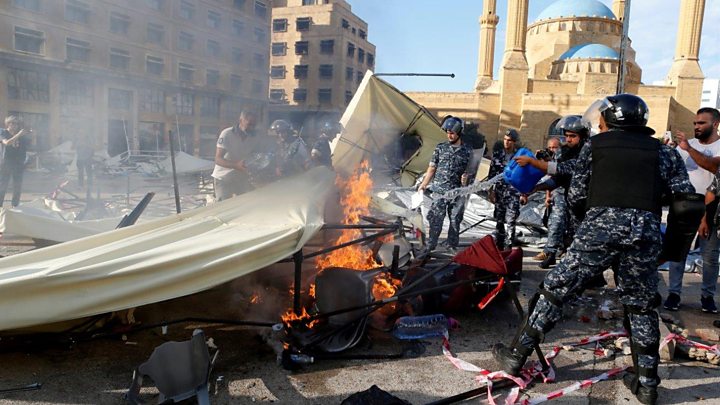Lebanon’s Prime Minister Saad Hariri has announced his resignation after 13 days of protests over political corruption and economic turmoil.
His televised address came soon after violence broke out on the streets, when supporters of two Shia groups attacked protest camps and roadblocks in Beirut.
They set tents on fire and beat anti-government demonstrators. Some chanted in support of Nasrallah, the leader for Hezbollah – a powerful force in the coalition government – and the Shia political party Amal.
Riot police and troops responded with tear gas, and by the end of the day, anti-government protesters were back on the streets celebrating Mr Hariri’s announcement.
Lebanon crisis: Prime Minister Hariri resigned after protests
Lebanon’s Prime Minister Saad Hariri has said he is resigning, amid protests that have gripped the country for almost two weeks.
Mr Hariri said Lebanon had reached a deadlock and needed a shock to break the crisis.
The announcement was met with cheers from protesters in Beirut.
The protests over political corruption and economic turmoil, began after now-scrapped plans to tax WhatsApp calls were introduced in mid-October.
Lebanon has one of the highest debt levels in the world.
The protests have led to a 10-day closure of banks, with many other offices, schools and universities also shut.
Last speech of Mr Hariri ?
In a televised address, the prime minister said he had reached a “dead end” and that he would tender his resignation and that of the government to President Michel Aoun.
Mr Hariri said: “For 13 days, the Lebanese people have waited for a decision for a political solution that stops the deterioration. And I have tried, during this period, to find a way out, through which to listen to the voice of the people.”
But he added: “It has become necessary for us to make a great shock to fix the crisis.
“Posts come and go, what matters is the safety and dignity of the people.”
President Aoun is still to comment. If the resignation is accepted, the constitution would require Mr Hariri to stay on until a new administration is established.
Current situation of the protests?
The prime minister’s announcement came as the situation on the ground turned increasingly violent, reflecting the deep-seated schism in Lebanese society.
The militant Shia group, Hezbollah, which has dominated the coalition government led by Mr Hariri, a Sunni, has recently hardened its stance against the protests.
On Tuesday, black-clad men loyal to Hezbollah and another Shia group, Amal, ransacked a protest camp in central Beirut, chanting slogans, setting tents on fire and beating anti-government demonstrators. A roadblock set up by protesters was also attacked.
Riot police and troops fired tear gas to separate the rival groups.
The protesters remained defiant in central Beirut. Less than an hour after being attacked they erupted into applause at the announcement of Mr Hariri’s resignation.
One demonstrator, Tima Samir, told Agence France-Presse: “This resignation is welcome but it is not enough… We want the entire system to change and we’ll stay on the streets until all our demands are met.”
